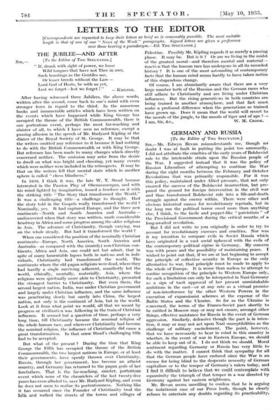LETTERS TO THE EDITOR
[Correspondents are requested to keep their letters as brief as is reasonably possible. The most suitable length is that of one of our "News of the Week" paragraphs. Signed letters are given a preference over those bearing a pseudonym.—Ed. THE SpEcr.vron.]
THE JUBILEE—AND AFTER
SIR.— [To the Editor of THE SPECTATOR.]
"If, drunk with sight of power, we loose Wild tongues that have not Thee in awe, Such boastings as the Gentiles use,
Or lesser breeds without the Law—
Lord God of Hosts, be with us yet,
Lest we forget—lest we forget I " —KIPLING.
After having witnessed three Jubilees, the above words, written after the second, conic back to one's mind with even stronger force in regard to the third. In the numerous books and innumerable articles which have been written on the events which have happened while King George has occupied the throne of the British Commonwealth, there is one portentous event, perhaps the most far-reaching and sinister of all, to which I have seen no reference, except a passing allusion in the, speech of Mr. Rudyard Kipling at the dinner of the Royal Society of St. George. It may be that the writers omitted any reference to it because it had nothing to do with the British Commonwealth or with King George. But reference has been made to many changes which directly concerned neither. The omission may arise from the desire to dwell on what was bright and cheering, yet many events which were neither were included in the retrospects. It may be that on the writers fell that mental state which in another sphere is called "chess blindness."
In 1890, I think it was, the late W. T. Stead became interested in the Passion Play of Oberammergau, and with his mind lighted by imagination, issued a brochure on it with the striking title "The Story that transformed the World." It was a challenging title—a challenge to thought. Had the story told in the Gospels really transformed the wcrld ? Nominally, yes. It had captured Europe, and the three new continents—North and South America and Australia— undiscovered when that story was written, made considerable headway in Africa and some progress among the older religions in Asia. The advance of Christianity, though varying, was on the whole steady. But had it transformed the world ?
When one considered the position of the nominally Christian continents—Europe, North America, South America and Australia—as compared with the (mainly) non-Christian con- tinents, Africa and Asia, one could not but admit, that in spite of many lamentable lapses both in nations and in indi- viduals, Christianity had transformed the world. The continents where the old pagan religions were dead, where they had hardly a single surviving adherent, manifestly led the world, ethically, mentally, materially. Asia, where the religions were spiritually more akin to Christianity, presented the strongest barrier to Christianity. But even there, the second largest nation, India, was under Christian government and largely under Christian influence, and the same influence was penetrating slowly but surely into China, the largest nation, not only in the continent of Asia, but in the world. Look at it from what point we would, all that we meant by progress or civilization was following in the train of Christian influence. It seemed but a question of time, perhaps a very long tune, till Christianity became the nominal religion of the whole human race, and wherever Christianity had become the nominal religion, the influence of Christianity did cause a great transformation. In that sense Stead's challenging title had to be accepted.
But what of the present ? During the time that King George the Fifth has occupied the throne of the British Commonwealth, the two largest nations in Europe, or at least their governments, have openly thrown over Christianity. Russia, through her government, has become an atheist 'country, and Germany has returned to the pagan gods of her forefathers. That is the far-reaching, sinister, portentous event which none of the chroniclers of the last twenty-five years has even alluded to, save Mr. Rudyard Kipling, and even he does not seem to realize its portentousness. Nothing like it has occurred since the Founder of Christianity trod the hills and walked the streets of the towns and villages of
Palestine. Possibly Mr. Kipling regards it as merely a passing phase. It may be. But is it ? Or are we living in the midst of the greatest moral—and therefore mental and material— reaction that the human race has undergone in all its recorded history ? It is one of the most astounding of contemporary facts that the human mind seems hardly to have taken notice of this stupendous change.
Of course, I am abundantly aware that there are a very large number both of the Russian and the German races who still adhere to Christianity and are living under Christian influences. But the rising generations in both countries are being trained in another atmosphere, and that fact must make a profound difference when the generations so trained have grown up. Does it mean that the world will revert to the morals of the jungle, to the moods of tiger and of ape ?-


































































 Previous page
Previous page